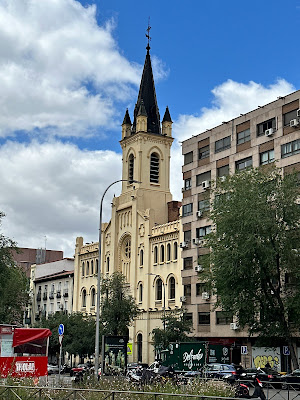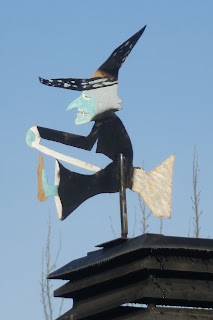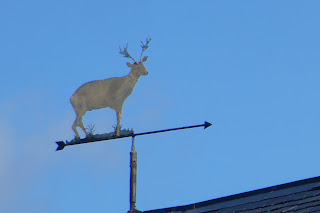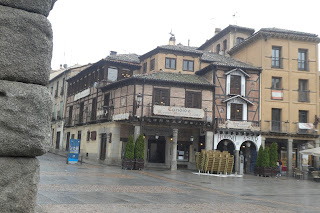Today's "tombstone" was photographed at the Cementerio Sur in Madrid, Spain.
Maria Josefa Garcia Martin is my mother-in-law, who died a few months ago in Madrid, Spain. Everything about her final days was a strange experience to me. Her home care, her hospital care, her funeral arrangements, her final resting place, and the legal bureaucracy of settling her estate in a foreign country were overwhelming not just emotionally, but also physically exhausting. We finally were able to see her "tombstone" when we visited Madrid for her funeral mass.
In Spain, and in many European countries, the deceased is laid out for visitation (velatorio) at a tanatorio within a few hours of death, and buried the next morning. The remains are not embalmed. There is no delay, and the funeral mass (for Catholics) is held a month later in the church. The tanatorio funeral director arranges for all the legal paperwork and for the burial place.
There are several very large public cemeteries in Madrid, and the public tanatorios are enormous, handling dozens of funerals at the same time. It is an amazingly quick and streamlined process. Cremations are not common, but are available. Usually just close friends and family attend the velatorio, and attendance at the mass held later is much higher. For Maria, friends and family from all over Spain came to Madrid for her funeral mass in December at the neighborhood Catholic church.
Cemeteries are completely different in Spain from cemeteries in New England, especially in the urban areas. Most people in Spain have insurance which pays for the funeral and final expenses including a gravesite or niche in a columbarium. Niches are by far the most popular, since family gravesites are rare and expensive. Niches are rented in five or ten year increments, or even rented for 100 years. At the end of the rental agreement you may extend the rental or the body is exhumed, the niche is cleaned out and rented again. Since the body was not embalmed, there may only be bones. These remains are reburied in a common burial ground or ossuary.
If an American dies abroad, the US Embassy can provide a CRODA certificate, which serves as a death certificate along with the Spanish death certificate. A CRODA certificate will help with settling the estate and legal matters back in the United States, such as social security or life insurance, and it is neccessary if the remains are being taken back to the US (including cremains). CRODA is a Consular Report of a Death Abroad. The embassy staff in Madrid was very helpful to us both when Vincent's mom died, and also years ago when his father died and we had to bring his ashes back to the United States.
You can see that the columbarium at the Cemeterio Sur had walls four niches high. Rolling ladders were available for placing flowers. Vincent bought some poinsettias and left them at his mother's niche.
A little bit of genealogy:
Maria Josefa Garcia, born 8 July 1934 in Orbaiceta, Navarra, Spain and died 11 October 2023 in Madrid, Spain. She married Vicente Rojo, son of Moises Rojo and Anacleta Benito, on 9 January 1960 in Madrid.
Generation 1: Jose Garcia, born 28 November 1908 in Bouza, Salamanca, Spain and died 3 December 1994 in Madrid, Spain, married on 8 September 1933 in Villar de Ciervo, Salamanca, Spain to Maria Consuelo Martin, born 11 November 1908 in Villar de Ciervo, and died 29 April 2001 in Madrid.
Generation 2: Sebastian Garcia, born 6 May 1878 in Fraga, Huesca, Spain, and died 22 June 1962 in Puerto Seguro, Salamanca, Spain, married on 9 April 1902 to Maria Ribero, born 4 June 1873 and died 21 January 1944.
Manuel Martin, born about 1880 in Barcelona, Spain and died 10 September 1971 in Villar de Ciervo, Salamanca, Spain, married 23 January 1904 in Villar de Ciervo to Josefa Rivero, born 23 October 1884 in Villar de Ciervo, and died 17 November 1937 in Villar de Ciervo.
Generation 3: Celestino Garcia, born 25 May 1851 in Barba de Puerco (now Bouza), Salamanca, Spain, and died 11 February 1914, married on 1 December 1877 in Barba de Puerco to Joaquina Munoz, born 30 September 1858 in Puerto Seguro, Salamanca, Spain, and died 2 December 1893 in San Vicente, Badajoz, Spain.
Vanancio Ribero married Rosalia Montero on 11 June 1856 in Barba de Puerco (now Bouza), Salamanca, Spain.
Mateo Martin, born in Vitigudino, Salamanca, Spain married Manuel Ventura.
Manuel Rivero, born 24 December 1850 in Villar de Ciervo, Salamanca, Spain, married Ofofila Gonzalez, born 17 January 1849 in Villar de Ciervo, Salamanca, Spain
Generation 4: Juan Antonio Garcia, born 8 March 1825 in Puerto Seguro, Salamanca, Spain, married Ramona Espinazo, born 15 June 1820 in Puerto Seguro, Salamanca Spain.
Bernardino Munoz married Ynes Zato, born 23 April 1834 in Puerto Seguro, Salamanca, Spain.
Ambrosio Ribero married in 1813 to Ynes Martin
Antonio Montero, born 21 November 1809 in Barba de Puerco (now Bouza), Salamanca, Spain, and died 31 December 1845 in Puerto Seguro, Salamanca, Spain, married to Catalina Espinazo, born 25 November 1806 in Barba de Puerco.
For the truly curious:
Consular Report of a Death of a U.S. Citizen Abroad: https://travel.state.gov/content/travel/en/international-travel/while-abroad/death-abroad1/consular-report-of-death-of-a-u-s--citizen-abroad.html
Cementerio Sur Carabanchel, Madrid, Spain https://sfmadrid.es/cementerio/cementerio-sur-carabanchel
---------------------
To cite/link to this blog post: Heather Wilkinson Rojo, "Maria Josefa Garcia Martin, Madrid, Spain, Tombstone Tuesday", Nutfield Genealogy, posted January 23, 2024, ( https://nutfieldgenealogy.blogspot.com/2024/01/maria-josefa-garcia-martin-madrid-spain.html: accessed [access code]).








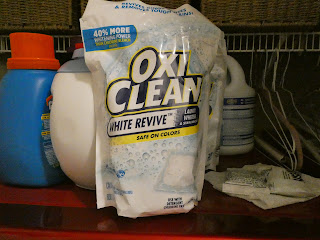
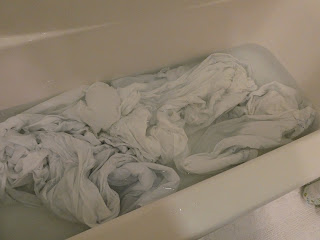











.jpg)


.jpg)




